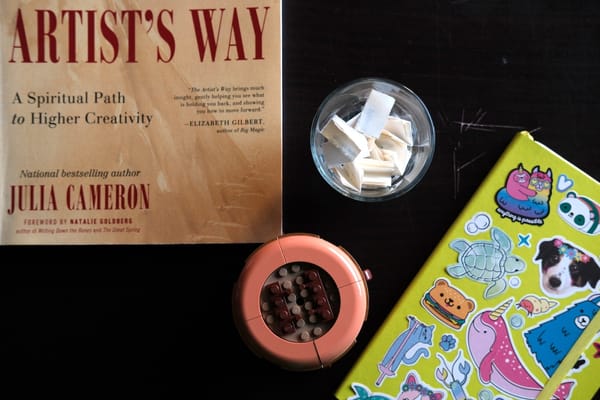Cultural competence & pop culture
Do you need to have a working knowledge of pop culture to be effective at marketing?
Note from Jenn:
My biggest piece of news: I was accepted into the Substack Grow writing program! It’s a six-week program that I hope will help me hone in on what to cover in tanJennts and also connect me with other writers. Speaking of Substack, take a moment to introduce yourself in this thread. I want to know more about my readers!
- What I found most interesting about this study on how ingesting caffeine before a shopping trip impacted your purchases was that it says, “The research team ran three experiments in retail stores -- an industry that's increasingly been adding coffee bars near their entrances.” Except wasn’t coffee at the entrance of shops the norm a few decades ago? My very first coffee experience was complimentary coffee at the grocery store (one sip from my dad’s cup was all it took to avoid coffee for a while).
- If you need a laugh, “I Should be Able to Mute America” was a great piece written by an Australian comedian on the overflow of US Twitterverse into every other country’s -verses.
- Writer RJ Joseph goes in on what happened at Expo in April and the multitude of COVID cases that occurred afterwards. Part 1 here.
- I am officially halfway through The Artist’s Way course. 🎉
I was quoted in this piece on gesha coffee: “Why the Best Coffee on Earth Needs a Marketing Overhaul”.

Cultural competence & pop culture
Do you need to have a working knowledge of pop culture to be effective at marketing?
This is the question that I’ve been mulling over for a bit. The cultural competence part came in when I read a piece about therapists and building up a cultural competence of those who are “extremely online.” In marketing, it doesn’t seem like we call it cultural competence. Instead, we create buyer personas and market research. We do focus groups and ask if someone’s interested in such and such product, dutifully noting down their demographics.
The term “cultural competence” first occurred in a 1989 seminal research study on mental health and minority populations.
Here the model called “cultural competence” is explored. It involves systems, agencies, and practitioners with the capacity to respond to the unique needs of populations whose cultures are different than that which might be called "dominant" or "mainstream" American.
Since then, the phrase has moved beyond the medical community to general inclusion and diversity efforts.
Improving cultural competence in the workplace can improve your productivity and performance, but takes time and a commitment to education.
It seems to be a catch-all phrase that one could use to say that their company provides training in cultural competence. When in reality, it’s more likely that they have something that covers the surface of communications but not the underlying structural issues (most DEI programs fail).
My familiarity with it is from business people talking about the various customs and traditions they need to know before doing business with those of a different international culture (i.e. US businesses trying to capitalize on the Chinese market). It made sense to me: knowing what to do and what not to do would go further in gaining respect than approaching every international business deal like it’s a US business.
To me, it seems like marketing and cultural competence go hand-in-hand. Understanding and keeping up with pop culture appears to be a subset of this. Yes, you can tweet out general marketing messages, but what if you anchor one of them with references or a meme to say…Bridgerton. Or Stranger Things. Your targeted group will shrink, but this group’s interest in you increases. It reminds me of an interview I did a few years ago with David Yake, co-founder of Camber Coffee, where he talked about serving up a drink called “Old Gregg.” The drink’s name is a reference to a character in a British comedy series.
And my business partner was really thrown off by it and was texting me when the post went live on Saturday morning, like “What is this?” He wasn’t familiar with the meme or the video. And so he had no frame of reference – “Why are we talking about drinking things out of shoes?” and “This is really gross. This is so off-brand, what are you thinking?”
But on the flip side, we got an overwhelmingly positive response to that post and also to the drink. I don’t think it had any negative impact on the drink sales or how people perceived it or enjoyed it. So I think if we could go back, maybe we would change the caption slightly but I think we would do it again.
Pop culture knowledge has always been a black hole for me. Because my parents didn’t grow up in the US, I didn’t get exposed to shows like Golden Girls or movies like Top Gun (still haven’t seen either, they’re on my very long list of things to watch). I don’t have TV channels anymore so I don’t watch anything “live.” I’d rather binge. However, I do try and watch some current shows or read articles for ones I don’t want to watch.
This all being said, I believe that keeping up with pop culture can only enhance your marketing skills. It also gives you a good reason to watch that show (any show) that everyone’s been talking about. If you can’t relate to your customer base, putting yourself in their shoes or identifying them in any way, you end up sequestered away in an ivory tower, dictating marketing strategies that aren’t quite honed in on your customers.

🤳🏻 social media
Twitter launched an ad campaign planner, integration with Shopify so you can display products on your profile page, and new info for businesses to display in their profiles (location, hours, etc.). And, it’s testing Notes (longform tweets, upcoming support for writers).
Instagram added new “nudges” such as topic changes and take-a-break prompts for teens (take a look if you create content for teens or are a parent of one).
Meta added new monetization features for creators and updated its reviews policy to detect fraudulent reviews. It’s testing a feed that kind of looks like TikTok.
📤 digital marketing
- How to Write a Price Increase Letter + Examples: Writing a price increase letter to customers can help ease tensions, but what process do you take, and how do you write the price increase letter? [not exactly digital marketing but you can use digital marketing channels to communicate this]
- YouTube vs. TikTok: Which Is Better for Your Business in 2022?: Short-form video is dominating the social media landscape — and many marketers want to get a piece of the action. But this leaves one important question: which video-sharing platform is worth your time, effort, and money — YouTube or TikTok?
- How to Identify and Fix Poorly Performing Facebook Ads: In this article, you’ll learn how to improve your Facebook ads results by updating everything from objectives and targeting to offers and creatives.
👀 interesting reads
- The Numbing Rise of I.P. TV: Whereas golden-age television aspired to bring viewers something unexpected, a new glut of ripped-from-the-headlines content gives them exactly what they’ve had before.
- Influencer Creep: Self-documenting and self-branding are becoming basic to all forms of work.
- What Does the New Craze For Pet Portraits Say About the Times We Live In?: Since the pandemic, we’re more obsessed with our cats and dogs than ever. And that’s great news for illustrators. [I find this one funny because I was just gifted an illustrated portrait of Zoey.]


Thank you for reading tanJennts. Please like, comment, and/or share if you enjoyed this!




